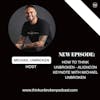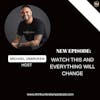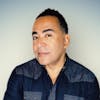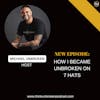E315: Asking for help as a survivor of trauma | CPTSD and Trauma Healing Coach
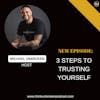
In this episode, I talk about the most important thing that I did for myself in healing from trauma, and that is asking for help. Many childhood trauma and abuse survivors are scared to ask for help or have an "I can do this on my own" mentality.
See show notes at: https://www.thinkunbrokenpodcast.com/e315-asking-for-help-as-a-survivor-of-trauma-cptsd-and-trauma-healing-coach/#show-notes
In this episode, I talk about the most important thing that I did for myself in healing from trauma, and that is asking for help. Many childhood trauma and abuse survivors are scared to ask for help or have an "I can do this on my own" mentality. The reality is that in order to continue to see progress or even get started, we have to leverage our communities, teams, and those that are willing to support us. This episode is a little longer than usual as I wanted to drive home some key points about how I implemented asking for help into my life and how everything changed through doing so.
Learn more about Think Unbroken and Pre-Order my new book: Unbroken Man. Plus, learn more about the free coaching and other mental health programs. Click here: https://linktr.ee/michaelunbroken
Support the Podcast: Become a listed sponsor!
Follow me on Instagram @MichaelUnbroken
Learn more about coaching at https://coaching.thinkunbroken.com
Get your FREE copy of my #1 Best-Selling Book Think Unbroken: https://book.thinkunbroken.com/
Hey! What's up everybody, welcome to another episode of the Michael Unbroken Podcast, sponsored by thinkunbroken.com.
Guys, I wanna talk to you about a really important subject matter for me today and that is the concept of asking for help. I think unequivocally that the most important thing that we can do as adult survivors of trauma, child abuse trauma any of the above is to put ourselves in a scenario in which we can make it acceptable for us to ask for help. I personally have battle against this concept in this idea, it feels like this innate kind of like visceral battle between my body and my spirit and my soul, you know when it comes to this concept of asking for help and I'm sure that many of you can relate to that.
I'm gonna do my best to try stay within the window of the time frame that you know I always say I will in these podcasts but this one might go a little bit over, I just feel like there's so many layers to this I often wonder what is the best way to approach this topic. Recently someone messaged me on Instagram and asked me if I would talk about this very topic and I said yes, of course because I know it all too well. And so, before I dive in, if you also have thoughts, if you would like to hear me, you know speak about a certain subject, if you have questions or anything that I can do to help you, reach out to me on Instagram, on Facebook, on any of the social media or email me at michaelthinkunbroken.com and will be more than happy to answer your questions, obviously keep in mind you know guys as I always say, I’m not a therapist, I'm not a doctor, you know, I'm just here to guide you with the tools that I've come cross in my life.
This concept of help this thing is really scary and even just hearing it sometimes can send us into a flurry where we're like, who are we gonna ask for help when we spend our whole life trying to figure this shit out on our own. I'm gonna tell you these hands down, the number call it one a most important thing that I've ever done in my life is ask for help.
Number one is taking ownership and accountability without question that will always be number one we have to own our shit, we gotta stop making excuses like that is priority number one. But that said when it comes to this idea of help like that is definitely won A, tight for first place, everybody's getting a gold medal on this one because I think it's really important. I would dare say and I could be wrong so, if I am wrong please someone message me, I'd be willing to say that in the expansive unbelievably long completely, like you're getting even have an idea of how long time really is, it's just not realistic I think in the human capacity but what I'm getting to is I don't know that any person who has done anything worth doing in history and history of mankind has done it alone maybe like, one guy did one thing, right? But reality is like we are a communal species by nature we thrive when we're in environment that supports our growth, when we aren't in an environment that gives us the tools through allies, through friends, through partners and relations and business and all the things more set up for success and asking for help is probably the biggest cornerstone and success, because it's really difficult to do anything by yourself.
And now if you're like, how I was a big conversation that's happening in your head is well fuck, I made it this far on my own, why the fuck do I need anyone else to help me? Who gonna help me? I made a through trauma, I made it through abuse, I made it through terrible relationships and drug addiction and alcoholism and you know all the crazy things that happen in one's life by myself. Well, my challenge to you if that's the question that you're asking yourself, why do I need anyone's help is are you really living your life at the level in which you're satisfied or there still bits and pieces that you know you can grow. And I guess that there are you know, it took me a long time to get to this place where I was willing to even contemplate the idea asking for help because as many trauma survivors know and many people have been traumatic events and their life know that it does feel like your back is against the wall that you have to figure shit out on your own and that was my case scenario. I recall being a child and time and time again you know if I were put in scenarios in which the police, the school, people at church, you know other family members asked you know where the bruises from, why do you look malnourished, why do you smell, being you know six, seven, eight, nine ten years old, I would have to lie not only to protect myself from more abuse that would come out of telling that truth or at least what my fear was at the time that more abuse would come from telling the truth and the sanity of our household which you know if you grow up in a community like I do the idea of ever sharing anything that happened in your home is blasphemy for me at its finest you'll probably get the shit kicked out of you.
So, I just had to not only protect myself because I would say that it is a protective mechanism not to ask for help embedded in our DNA, not only from years of generational trauma but also, it's a part of trauma that comes from you know what is embedded in as a youth. So, you're in this position as a child where you have to make decisions that children should never have to make or a teen, or in your early twenties because I even look at my early twenties, I'm like, I was a foolish child and I nothing of the world, hell, I still don't but you know when I'm like fifty, I'll be saying the same thing when I was in my thirties, I didn't know shit, I'm sure a lot of you guys can relate. And so, when you get to this place and you in a position to actually take control of your life, asking for help as a catalyst and getting you to the next level.
When I first decided to get very serious about this this whole process of healing not just the work that I do through Think Unbroken in the book and the podcast and the YouTube videos and all this shit, this side is not even really a part of the conversation. What I serious about getting help from my mental health, my physical health, my emotional health, my spiritual help I had to put myself in a position in which I had to ask myself a very important question was I willing to be vulnerable enough to put my hand out? And say, I need help because if I wasn't nothing was gonna change and I was gonna die because for years I never stepped into that, it was terrifying, the end of asking for help I would rather have someone take a baseball bat to my face then ask for help and sure part of that embedded to me as being a man and a concept that men will figure it out a more tough guys in blah, blah, blah, that's bullshit, every sport that we watch as a team sport those do aren't doing it on their own but somehow it's facilitated in society like, it's okay to figure it out without helping that's nonsense but that's a whole another conversation.
My point being is when I got to this place of needing to ask for help it was rock bottom that was the catalyst to get me there because I realized that so much of my life had been dictated by the actions I was taking while under for lack of a better term the influence of trauma drunk. I'm making that up right now, I was trauma drunk and what that means is that all the actions all the things occurring in my life I just assume that we're a part of everyone else's life, I was just like well this is what it's like because you lie to people, you cheat, you steal, you do bad things, you hurt people, you hurt yourself, you know poison the world like that's what trauma is, right? It wasn't until rock bottom in this moment I've shared it before so, I won't go into detail here but you know laying on before hundred and fifty pounds over overweight, smoking two packs a day, drinking my fucking face off or I came to this conclusion and it was as if in reality someone hit me in the face for the bat and they said wake up motherfucker, wake up because without that moment, that total catastrophic breakdown my rock bottom the lowest I've ever been, I would not be here right now. And I think that moment could have gone one of two ways, okay?
Avenue (a) is what's happening right now, I have stepped into being the person that I want to be, this Michael I have created this person from fucking scratch, from the dirt, from the rubble, from the lava, from the ash of everything that was before and I said to myself, this is the person that I want to be so, I will work towards that and that's took a very long time.
Avenue (b) I'm probably dead or in jail right now, I don't see it any other way, there was no in between, there was no middle, there is nothing that suggested to me that I could just be nonchalant about what was next in my life. And at twenty-eight years old that was a really big jump to make and I remember this conversation that I had with my Vin partner and I looked at it and I said, I need to go to therapy for real like, what I'd been doing for a couple of years prior in which I would go to the therapist and I would give them some money and I would just tell them whatever they wanted to hear because that's a good use of time and resources. But I decided that what I needed to do is actually get really fucking serious and I started doing the work and then I needed to get really serious about my health because here's what I realized; my mental health I had no idea, I'm not even joking like, if you took me back twenty five years old and you said, why are you doing the things that you're doing the poison, the drama, the chaos, being in the vortex of my life, I would have been like oh, this is just what people do, I didn't know I had no idea, again most trauma drunk. And so, I have this conversation with my girlfriend and I said, I think I'd really need real help, I don't wanna tell you why, I was terrified to tell her why, it was so foreign and this idea of sharing the dark parts of my past, it was awful, I get goosebumps, thinking about those conversations with her when she'd be like just let me in a little bit I like absolutely not. And I told, I was like you know, I'm gonna get serious about therapy and I started getting serious about therapy and it's a baby step process, right? So, that's where I started getting help with my mental health because I knew that cross was there and I had to make a decision.
When it came to my physical health, I realized I didn't know how to eat, I knew nothing of nutrition, growing up and I am dead fucking serious right now, I don't think I had a salad for the first time, I was probably twenty years old we had nothing but processed food and canned goods in our house and if we ate out, it was pizza, it was burgers, it was the dollar menu stuff and that was fueling my body for year and like you look at the capacity of school food like, that shit's poison, we are poisoning our children, this is a tangent, what do we do? What do we have to do to stop doing that? My point being is that I had to figure out how to take control of my health and the physical aspect as well and so, this started with learning about nutrition and reading books and asking my partner's mom who was probably is healthiest person I've ever known, you know, what do I need to do, how do I eat good food, how do I take care of this body, this vessel as I'm in this process of like trying to rewire all the trauma. And the other part of it was I had to work on my spiritual health and so, why I had asked for help in my mental health, I had asked for help in my physical health also I'll mention that I did have a personal trainer every now and then because like subconsciously I knew how to exercise, it just wasn't motivated but I had to get to this place where I also took care of my spiritual health. And it started with doing yoga in the living room because I was three hundred and fifty pounds and terrified to walk into a yoga studio into having real long in-depth conversations with multiple yoga teachers over years and years and years, about how to not step into the practice further but also how to understand the impact of yoga, that meditate practice, when it comes to trauma. And so, I'd asked for help in all of these arenas and it's wild to think what my life would have been like had I not done that, and it was scary like terrifying to ask for help because every wall that you have up exists in that moment, leading up till then because that's what we're trained. We are trained to be terrified of the idea that someone can have enough, empathy, passion, compassion, sympathy, care, love for us, that is probably the most terrifying thing that we step into as trauma survivors is how do we get to the place where we care enough about ourselves to let other people help us. It's a really difficult place to get to especially when we come from these places of abuse, no one was probably there for us as a child or if they were in there in the best capacity that they could be and oftentimes that's just not enough and sure, there's a level of measurable, resiliency that comes from someone in intervening in the trauma process but what happens when you're twenty five and your binge drinking and you're thirty and you're having sex with strangers from the internet, unprotected and you're forty and you're putting a gun in your mouth again and you're fifty and you hurt your children because the generational trauma has sip into you and again and again and again, those bad things that happened you are still happening. When are you gonna stop? When are you going to say you know what I deserve this? When you're gonna say, I deserve to be loved. What is it gonna take for you get to that place because I put the idea of love and asking for help hand in hand, those two things are exclusive to each other in some capacity because I think the only way you get one is with the other. And I think it's really important to note that there are professionals who are available to help you when you are ready to ask for help. There are people like me coach, there are mentors, there are therapists, psychologists, psychiatrists, there are doctors, there are people who have systems in place to help you when you are ready to be helped.
I wanna be very clear about something and this mistakes that I made, I ruined a lot of relationships, friendship, partnerships, businesses all the things by not really understanding how to keep my trauma separate from my life in a sense as I was going about the day to day activities and things that I needed to do and I realize that a lot of the relationships that I was building with people or had with people first off were built on fallacies, I mean that's a given, I lied a lot but the other part of it, I was growing and stepping into trauma, I was trauma bonding with people. Now if you don't know what trauma bonding is that is when you create connection based around the worst in your life that has happened, I don't know about you but that is not a healthy way to have a sustainable relationship regardless of the capacity of that relationship because you see a professional whether they're a coach or a mentor, a therapist, they're going to be able to help you process, they're gonna say oh, okay, cool well, blah, blah, blah equals blah, blah, blah, blah, right? And then you take that information, you leave their office, you see them again in a week, they're not there texting you and they're not the person you wake up to or have dinner with or go to go coffee with or any of those things. And so, we have to be very cautious when we are in the process of going through healing and asking for help because it'll be these moments where we want to open up, where we want to be more vulnerable to the world and that is not a bad thing but I just caution you to do it with the right people and the right capacity, your partner, boyfriend, girlfriend, husband, wife, kids, coworkers, bosses, friends, bicycle club people those are not the people that you share the in pieces of your trauma with unless they are qualified and fully willing to take that on.
So, just some food for thought I've been down that road and it feels natural to an extent when you start to break down those walls and then you realize the further you get into it that you're actually cannibalizing your relationships because your overs sharing, you're being too vulnerable which I do believe is a thing in certain capacities and so, I just caution you with that.
You know, the world is changing and as we continue to step into a society that wants growth, that wants healing, wants health, that wants conversations like these, it's going to become easier to have resources and it's gonna be easier to get to this place where you're willing to ask for help and it's going to be easier to love yourself because you're going to start to realize that other people love you too and that's my hope for you and that's why I made this video because I've been there, that's why I'm sharing this podcast because I've been there. I have sat on the floor with a gun in my fucking mouth thinking that there was no hope and I think that a big part of that is just because I was scared to ask for help. I was scared that I would be seen by another human being and I've come to realize that that's actually my greatest attribute that is the greatest gift that society has given me as this ability to be seen, as a child who felt invisible, even walking down the street covered in scars and bruises, as a kid who felt invisible and a teen who didn't know his ass from his elbows and a guy who in is twenty was doing anything to suffer at his own hands for lack of a better term, I wanted to be seen and that's what asking help gave me. And I hope that you'll be willing to step into that, that's my hope. We are here to support each other, I say we are not alone, we are not broken, we are the unbroken.
And that's a communal thing that is the capacity that comes along with your friends, with your families, with the team that you put together to support you and if you come across these people as you're in this journey and they don't support you, you need get those people out of your damn life because those are not people who are gonna help you go to the next level, right?
I wanna leave you with this…
There's a bit of a challenge because I know what it's like to have a concept of fear around the idea of asking for help. I just want you to start very simply, just find a piece of paper and write down three things in your life that you could use help with and they don't have to be trauma based, they could be putting aside on the garage, it could be you know changing a bike chain, it could be shopping for new shoes, it could be anything, anything, something that you know would just be a little bit easier if you ask for help and write those three things down and in the course of the next week, reach out to your friends, reach out to your community, reach out to the strangers on the internet who gives a shit somebody.
And so, you know I need help with this thing. I think that's a great gateway to something bigger. It's a lot easier to ask for help tying a tie than it is to ask for help to find a therapist but it's an evolution, it's what I always say it's baby steps but ultimately you have to decide what's best for you.
So, as usual thank you so much for listening, I know this one was a little bit longer than usual but I wanted to be because I really wanted to try to flesh that out for the person that asked.
So, again if you have questions that you want me to answer on the podcast DM me on all the social media at michaelunbroken or email me at michael@thinkunbroken.com you can buy the book Think Unbroken at thinkunbroken.com/paperback it's also on amazon kindle, you can also buy the paperback on amazon, I'm hoping to record the audiobook book very, very, very soon.
And Until Next Time.
My friends, Be Unbroken.
I'll see you.
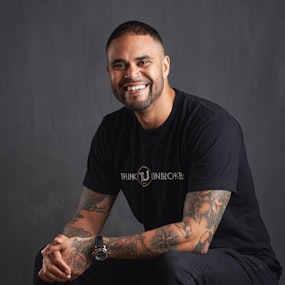
Michael Unbroken
Coach
Michael is an entrepreneur, best-selling author, speaker, coach, and advocate for adult survivors of childhood trauma.
Welcome to The Think Unbroken Podcast!
Here are some of my favorite recent guests!



























